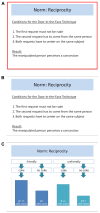Testing Is More Desirable When It Is Adaptive and Still Desirable When Compared to Note-Taking
- PMID: 30619005
- PMCID: PMC6305602
- DOI: 10.3389/fpsyg.2018.02596
Testing Is More Desirable When It Is Adaptive and Still Desirable When Compared to Note-Taking
Abstract
Testing is a well-established desirable difficulty. Yet there are still some open issues regarding the benefits of testing that need to be addressed. First, the possibility to increase its benefits by adapting the sequence of test questions to the learners' level of knowledge has scarcely been explored. In view of theories that emphasize the benefits of adapting learning tasks to learner knowledge, it is reasonable to assume that the common practice of providing all learners with the same test questions is not optimal. Second, it is an open question as to whether the testing effect prevails if stronger control conditions than the typical restudy condition are used. We addressed these issues in an experiment with N = 200 university students who were randomly assigned to (a) adaptive testing, (b) non-adaptive testing, or note-taking (c) without or (d) with focus guidance. In an initial study phase, all participants watched an e-lecture. Afterward, they processed its content according to their assigned conditions. One week later, all learners took a posttest. As main results, we found that adaptive testing yielded higher learning outcomes than non-adaptive testing. These benefits were mediated by the adaptive learners' higher testing performance and lower perceived cognitive demand during testing. Furthermore, we found that both testing groups outperformed the note-taking groups. Jointly, our results show that the benefits of testing can be enhanced by adapting the sequence of test questions to learners' knowledge and that testing can be more effective than note-taking.
Keywords: adaptivity; desirable difficulties; focusing; note-taking; test-based learning; testing.
Figures


Similar articles
-
Take notes, not photos: Mind-wandering mediates the impact of note-taking strategies on video-recorded lecture learning performance.J Exp Psychol Appl. 2023 Mar;29(1):124-135. doi: 10.1037/xap0000375. Epub 2021 Jun 24. J Exp Psychol Appl. 2023. PMID: 34166036
-
A mind-wandering account of the testing effect: Does context variation matter?Psychon Bull Rev. 2022 Feb;29(1):220-229. doi: 10.3758/s13423-021-01989-8. Epub 2021 Aug 13. Psychon Bull Rev. 2022. PMID: 34389933
-
The efficacy of learners' testing choices.J Exp Psychol Learn Mem Cogn. 2018 Apr;44(4):540-552. doi: 10.1037/xlm0000473. Epub 2017 Nov 2. J Exp Psychol Learn Mem Cogn. 2018. PMID: 29094989
-
Working with interpreters: an interactive Web-based learning module.Acad Med. 2002 Sep;77(9):927. doi: 10.1097/00001888-200209000-00029. Acad Med. 2002. PMID: 12228096 Review.
-
Teaching interdisciplinary geriatrics team care.Acad Med. 2002 Sep;77(9):935. doi: 10.1097/00001888-200209000-00040. Acad Med. 2002. PMID: 12228107 Review.
Cited by
-
Learning With a Double-Edged Sword? Beneficial and Detrimental Effects of Learning Tests-Taking a First Look at Linkages Among Tests, Later Learning Outcomes, Stress Perceptions, and Intelligence.Front Psychol. 2021 Aug 31;12:693585. doi: 10.3389/fpsyg.2021.693585. eCollection 2021. Front Psychol. 2021. PMID: 34531789 Free PMC article.
References
-
- Adesope O. O., Trevisan D. A., Sundararajan N. (2017). Rethinking the use of tests: a meta-analysis of practice testing. Rev. Educ. Res. 87 659–701. 10.3102/0034654316689306 - DOI
-
- Agarwal P. K., Karpicke J. D., Kang S. H. K., Roediger H. L., McDermott K. B. (2008). Examining the testing effect with open- and closed-book tests. Appl. Cogn. Psychol. 22 861–876. 10.1002/acp.1391 - DOI
-
- Bae C. L., Therriault D. J., Redifer J. L. (2018). Investigating the testing effect: retrieval as a characteristic of effective study strategies. Learn. Instr. (in press). 10.1016/j.learninstruc.2017.12.008 - DOI
-
- Berthold K., Renkl A. (2010). How to foster active processing of explanations in instructional communication. Educ. Psychol. Rev. 22 25–40. 10.1007/s10648-010-9124-9 - DOI
-
- Bjork E. L., Bjork R. A. (1992). “Making things hard on yourself, but in a good way: creating desirable difficulties to enhance learning,” in Psychology and the Real World: Essays Illustrating Fundamental Contributions to Society, eds Gernsbacher M. A., Pew R. W., Hough L. M., Pomerantz J. R. (New York, NY: Worth Publishers; ), 55–64.
LinkOut - more resources
Full Text Sources
Research Materials

